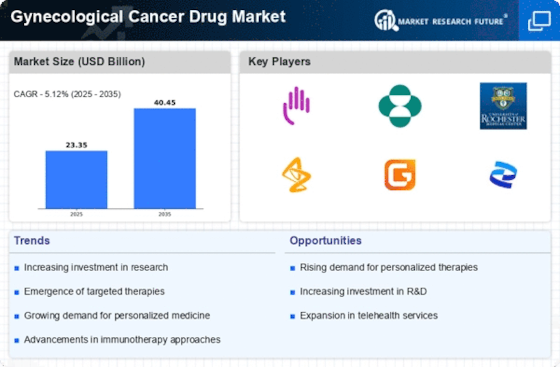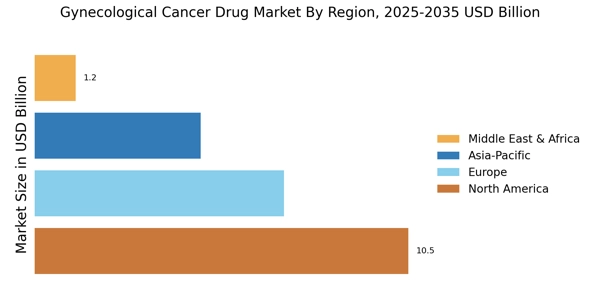Advancements in Targeted Therapies
Advancements in targeted therapies represent a significant driver for the Gynecological Cancer Drug Market. These therapies, which focus on specific molecular targets associated with cancer, have shown promising results in clinical trials. For instance, the introduction of PARP inhibitors has transformed the treatment landscape for ovarian cancer, leading to improved patient outcomes. The market for these targeted therapies is projected to grow substantially, with estimates suggesting a compound annual growth rate of over 10% in the coming years. As more targeted therapies receive regulatory approval, the Gynecological Cancer Drug Market is likely to witness an influx of innovative treatment options, catering to the diverse needs of patients.
Regulatory Support for Drug Approvals
Regulatory support for drug approvals is a vital driver for the Gynecological Cancer Drug Market. Regulatory agencies are streamlining the approval process for new cancer therapies, which encourages pharmaceutical companies to invest in the development of innovative treatments. Initiatives such as accelerated approval pathways and priority review designations are facilitating quicker access to new drugs for patients. This supportive regulatory environment is expected to enhance the market landscape, as more therapies become available to address the unmet needs of patients with gynecological cancers. Consequently, the Gynecological Cancer Drug Market is poised for growth as new and effective treatment options are introduced.
Increased Investment in Cancer Research
Increased investment in cancer research is a crucial driver for the Gynecological Cancer Drug Market. Governments and private organizations are allocating substantial funds to support research initiatives aimed at understanding gynecological cancers better. This financial backing facilitates the development of novel drugs and treatment modalities, enhancing the overall market landscape. For example, funding for clinical trials has surged, allowing for the exploration of new therapeutic avenues. As a result, the Gynecological Cancer Drug Market is expected to benefit from a steady stream of innovative products entering the market, ultimately improving patient care and treatment outcomes.
Rising Incidence of Gynecological Cancers
The increasing incidence of gynecological cancers, such as ovarian and cervical cancer, is a primary driver for the Gynecological Cancer Drug Market. According to recent statistics, the prevalence of these cancers has been on the rise, with cervical cancer cases estimated to reach over 600,000 annually. This alarming trend necessitates the development and availability of effective therapeutic options, thereby propelling the market forward. As awareness about these cancers grows, more women are seeking medical attention, leading to higher demand for innovative treatments. The Gynecological Cancer Drug Market is thus positioned to expand as pharmaceutical companies invest in research and development to address this pressing health concern.
Growing Awareness and Education Initiatives
Growing awareness and education initiatives surrounding gynecological cancers are significantly influencing the Gynecological Cancer Drug Market. Campaigns aimed at educating women about the risks and symptoms of these cancers have led to earlier detection and increased screening rates. This heightened awareness is driving demand for effective treatment options, as more women seek medical intervention upon diagnosis. Furthermore, healthcare providers are increasingly emphasizing the importance of regular check-ups and screenings, which contributes to the overall growth of the market. As awareness continues to expand, the Gynecological Cancer Drug Market is likely to experience sustained growth, driven by the need for innovative therapies.

















